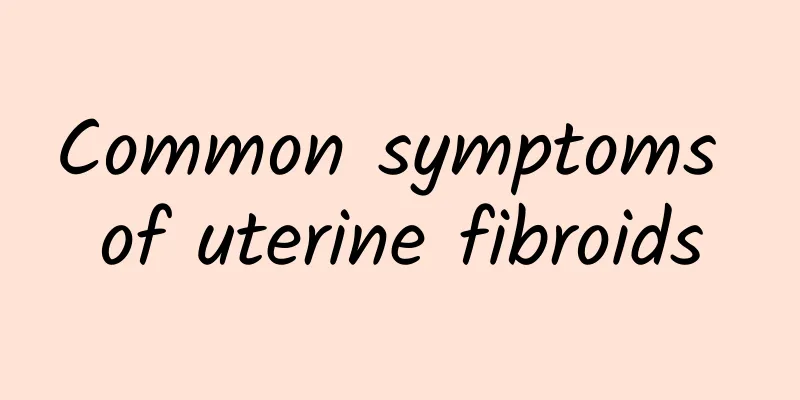Are scar-prone constitutions more likely to cause intrauterine adhesions? Will this affect fertility and health?

|
Intrauterine adhesion, also known as scarred uterus, is a common gynecological disease. It is mainly caused by severe adhesion of the uterine cavity wall due to surgery, infection and other reasons, resulting in complete or partial closure of the mucosa in the uterine cavity. Whether scarred physique is more prone to intrauterine adhesion has become the focus of many people's attention. Are people with scar constitution more susceptible to intrauterine adhesions? The answer is yes. Scar constitution refers to the characteristics of skin, tissue or organ that produce obvious scars due to individual differences during the wound repair process, which takes a long time to heal and is easy to form scar tissue. People with this constitution are more susceptible to intrauterine adhesions than the general population. First, scar tissue tends to overdevelop during repair in the uterine cavity, leading to mucosal adhesions. Studies have shown that scar tissue has a much higher density of fibrous tissue than normal tissue and is not easy to dissipate, so it is more likely to cause mucosal adhesions in the uterine cavity. Such adhesions can affect the development and normal function of the endometrium, thus adversely affecting fertility. Secondly, people with scar-prone constitutions often have scar hyperplasia during the healing process of surgical trauma, which makes the endometrium susceptible to scar tissue, thereby increasing the risk of intrauterine adhesions. Scar tissue is not only prone to adhesions, but may also affect the normal blood supply to the endometrium, leading to problems such as abnormal menstruation, infertility, or multiple miscarriages. Finally, the impact of scar tissue itself on the endometrium is also worth paying attention to. Studies have found that scar tissue often contains abnormal vascular structures, which may lead to insufficient or even complete interruption of blood supply to the endometrium, leading to serious consequences such as infertility and ectopic pregnancy. In summary, women with scar constitutions are more susceptible to intrauterine adhesions, and scar uterine adhesions pose a serious threat to women’s fertility and health. Therefore, for women with scar constitutions, once intrauterine adhesions are discovered, they should be treated as soon as possible to avoid greater impact on fertility and health. 1. Advances in modern medicine have brought widespread attention to the issue of people with scar-prone constitutions being more susceptible to intrauterine adhesions. 2. Some methods to improve scar constitution, such as surgical repair and physical therapy, can help reduce the risk of intrauterine adhesions. 3. Improving women's self-care awareness, regular physical examinations and consulting doctors can help detect and deal with intrauterine adhesion problems in advance. |
>>: Is it normal to have menopause again after one and a half years? Causes and solutions
Recommend
If you want to know whether you have an ectopic pregnancy, you need to look at the symptoms
In recent years, more and more women have experie...
What are the methods for treating vaginitis?
Different vaginitis requires different treatments...
Fang Siyu reveals the secret of maintaining a good figure by doing bodyweight squats to increase muscle and burn fat
Fang Siyu, a well-known actress who started out a...
How can mothers who have had miscarriage or premature birth protect their babies?
Traditional culture also attaches great importanc...
What are the symptoms of mild endometrial tuberculosis?
Many people may not know about endometrial tuberc...
What causes ovarian cysts?
What is the cause of ovarian cysts? How do you ge...
Women should fully understand the causes of cervical erosion
At present, the incidence of cervical erosion is ...
How to regulate women's menstrual irregularities through diet?
How to adjust women's menstrual irregularitie...
Drinking alcohol can make you fat, but quitting drinking will definitely make you lose weight? Nutritionist Zhao Hanying: The key lies in these three reasons
Well-known actress Xiao Zhen once shared that she...
Eating vinegar is healthy! Improve metabolism and reduce visceral fat
Everyone wants to reduce their visceral fat and h...
What are the dangers of menopause?
Modern society has caused health problems for wom...
Symptoms of early uterine fibroids Common treatments for uterine fibroids
Early uterine fibroids are benign tumors composed...
Can drinking vinegar delay menstruation? Impossible!
Shanshan's mother is worried that the menstru...
No oil retention during confinement! Drink black bean and eucommia chicken soup for health
As the saying goes, "If the baby is born suc...
Can Fengyoujing cause miscarriage? Let's find out
I believe we are all familiar with Fengyoujing, w...









